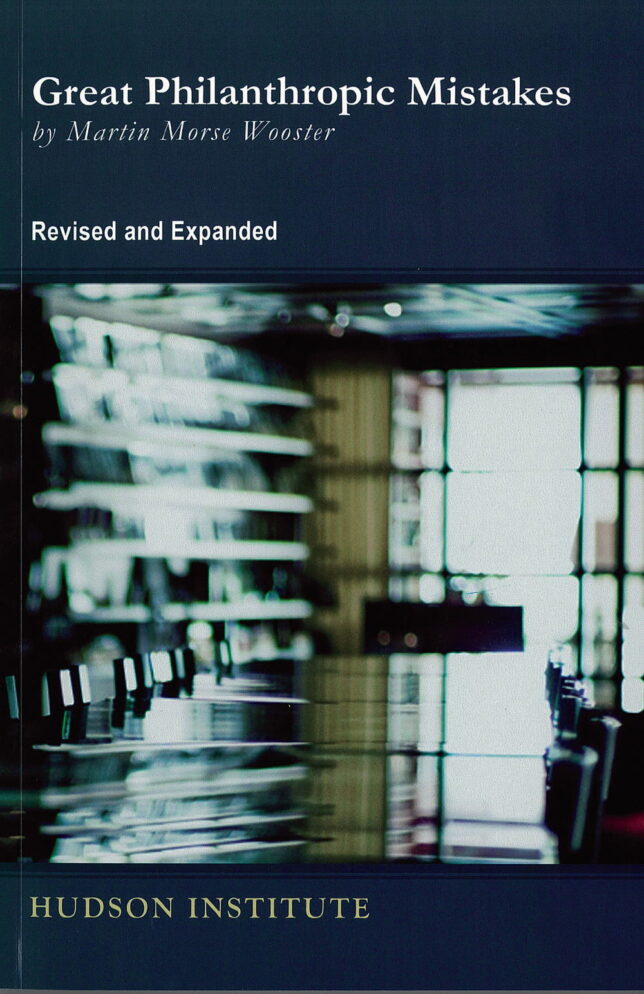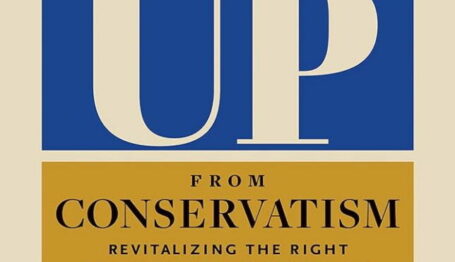Special Report
Martin Morse Wooster: Martin’s Genuine “Civic Participation”
A brilliant eccentric who battled Big Philanthropy and Big Government
 In his Great Philanthropic Mistakes, Martin skewers such things as the Rockefeller Foundation’s meddling in “population control” and medical education, Carnegie’s jump-starting of “public” television, and the Ford Foundation’s “gray areas” program that aspired, but failed, to help poor people. Credit: Amazon. License: https://amzn.to/3RDZZkT.
In his Great Philanthropic Mistakes, Martin skewers such things as the Rockefeller Foundation’s meddling in “population control” and medical education, Carnegie’s jump-starting of “public” television, and the Ford Foundation’s “gray areas” program that aspired, but failed, to help poor people. Credit: Amazon. License: https://amzn.to/3RDZZkT.

Martin Morse Wooster, 1957–2022 (full series)
Book Man | Martin’s Genuine “Civic Participation”
Big Martin vs. Big Philanthropy
Martin’s Genuine “Civic Participation”
These days, the term “civic participation” is used to describe left-wing schemes in which billionaire foundations pour cash into “nonpartisan” charities that drive targeted demographic groups into absentee voting. But Martin understood what real civic participation is—love of your neighbors, your local sports teams, and your local civic festivals. Hazlett recalls how Martin “viewed every parade, and devoured each spectacle.” All of these little platoons really mattered, Martin knew, far more than some overpaid philanthropoid’s gassing on about how he was saving the planet through politics—while enjoying an expense account that would shame a Fortune 500 CEO.
Perhaps Martin’s finest work on the great struggle between true charity and fake philanthropy was his book for Capital Research Center entitled, Return to Charity? Philanthropy and the Welfare State. He argued that bad as Big Philanthropy is, the faceless bureaucrats of governments’ pseudo-philanthropy are even worse. Of course, he added, the triumph of the welfare state over America’s local charities occurred in large part due to the early Big Philanthropies like the Russell Sage Foundation. These foundations became intoxicated with fashionable foolishness and helped spread the un-American idea that Big Problems need Big Solutions delivered by Big Government. That is, foundations began to see themselves, not as benefactors of local charities and actual human beings, but as social experimenters who would test out trendy notions in a few locales before handing off the new programs to centralized government and its social engineers.
Martin deplored this kind of “state-funded welfare” which he knew was far inferior to “morally centered charity.” He often cited the great black advocate of local associations, Bob Woodson, who “wrote that poor people, when they needed help, were far more comfortable dealing with voluntary associations they created—churches, families, local groups.”
“Government,” Woodson insisted, “doesn’t give you values. There is nothing more important” for struggling kids than “reestablishing a sense of their own self-worth, the value of American institutions, and becoming reacquainted with the spiritual side of life”—none of which will come through “anything governmental.” Yes, in an emergency like a hurricane, some elements of government may be needed to provide temporary help. But most of the time, Martin knew, both life’s joys and society’s flourishing arise from “little platoons,” from citizens who come together to help each other and to celebrate their distinct locales and particular passions. And where neighborhoods and little platoons were concerned, Martin followed SF master Robert Heinlein’s advice: “to enjoy the flavor of life, take big bites.”
Two years after Return to Charity, Martin wrote a related volume for the Manhattan Institute, By Their Bootstraps: The Lives of Twelve Gilded Age Social Entrepreneurs, which recounted the achievements of notables like Clara Barton, founder of the Red Cross; Father Flanigan, founder of Boys Town; and Robert Baden-Powell, founder of the Boy Scouts, who flourished between 1850 and 1910. Marvin Olasky kindly contributed an introduction, but perhaps the best summary of the book came from Martin himself:
The consensus of poverty fighters and philanthropists in about 1890 would be this: everyone should give; no one should give indiscriminately; government aid hurts more than it helps. It would be the next generation—who were born between 1860 and 1870, and who began to write and work at the turn of the century, who would argue that charity could not cure poverty and that only professional social workers administering government doles should aid the poor.
In the next installment, Martin relentlessly hammered Big Philanthropy.



